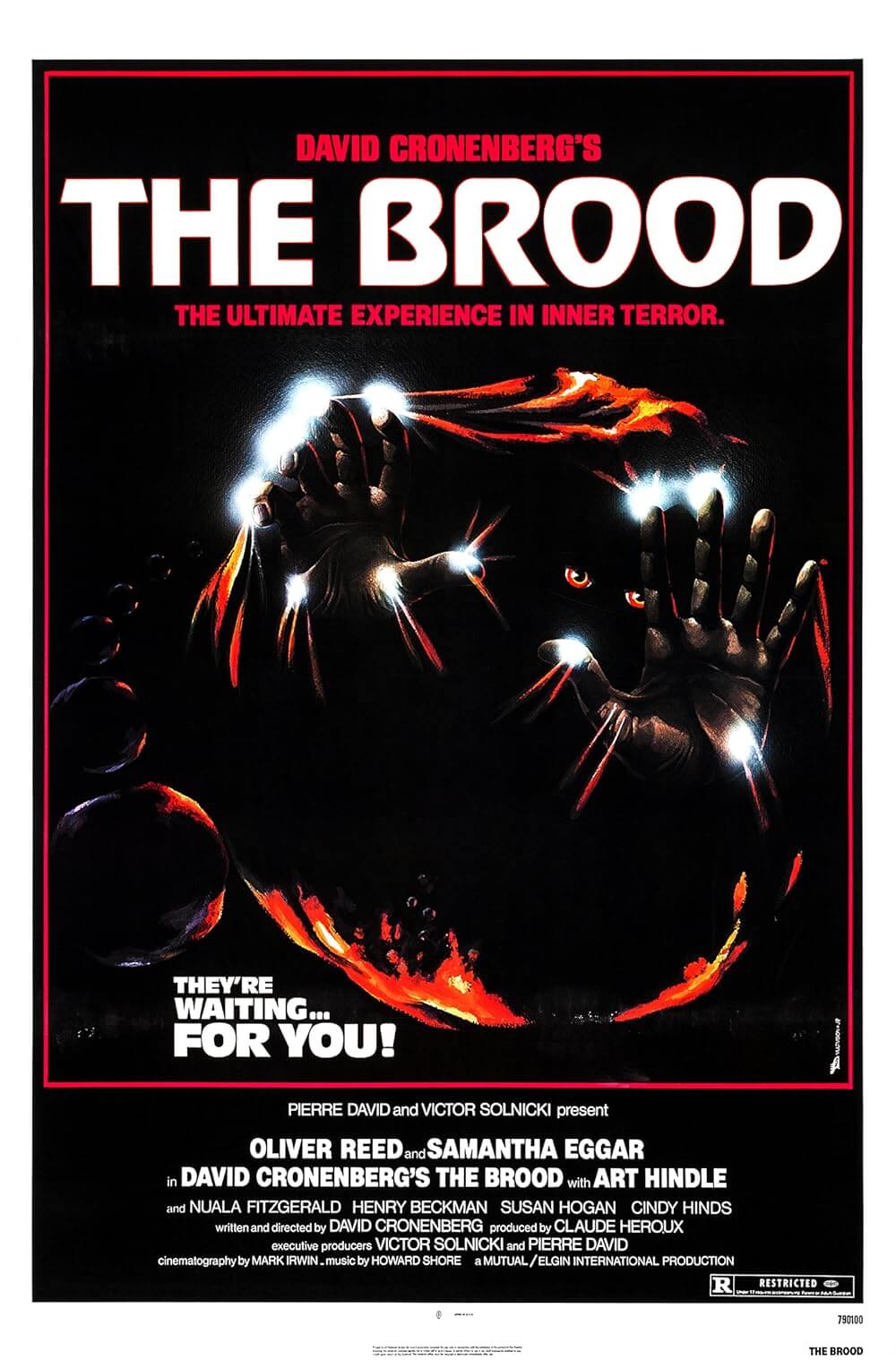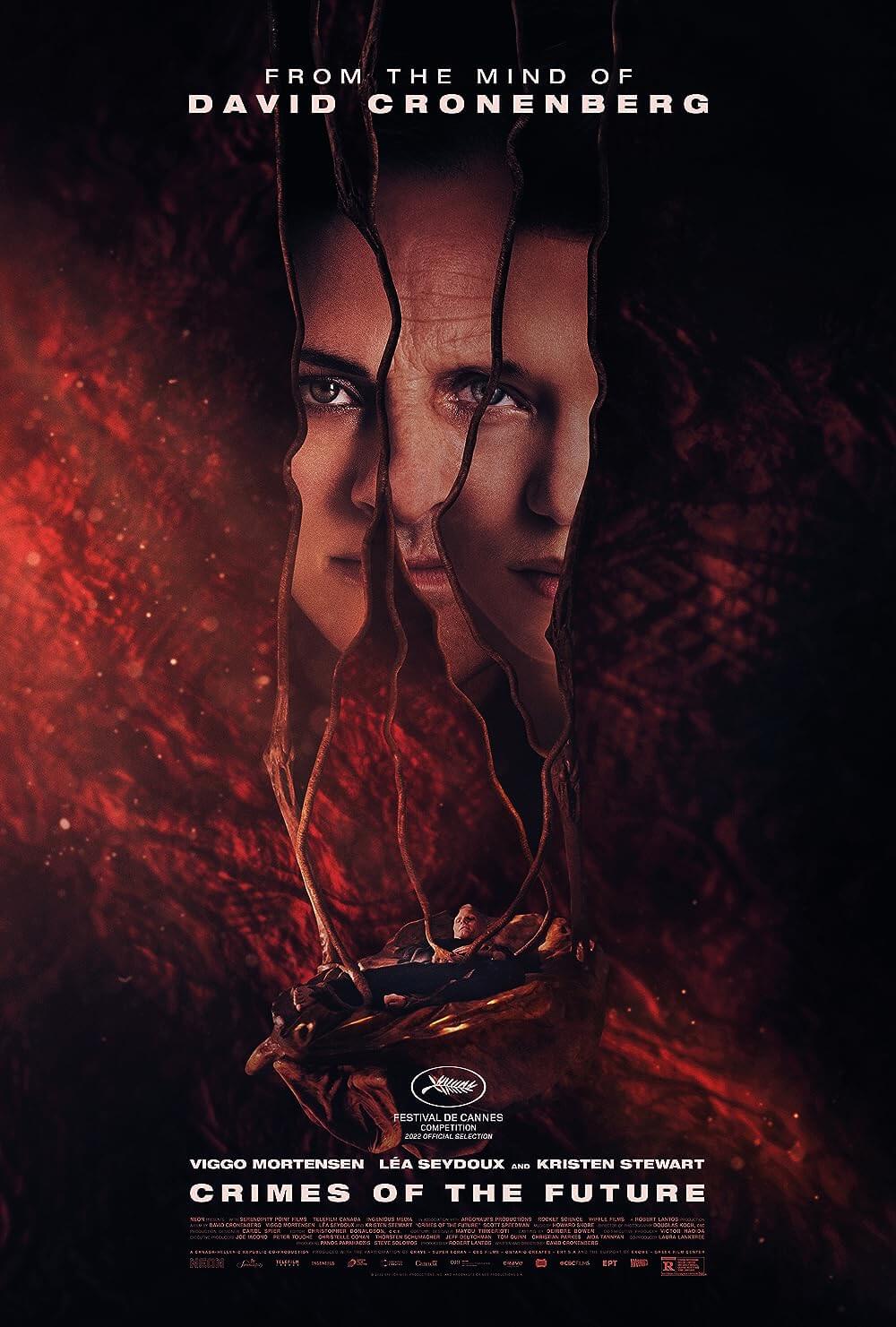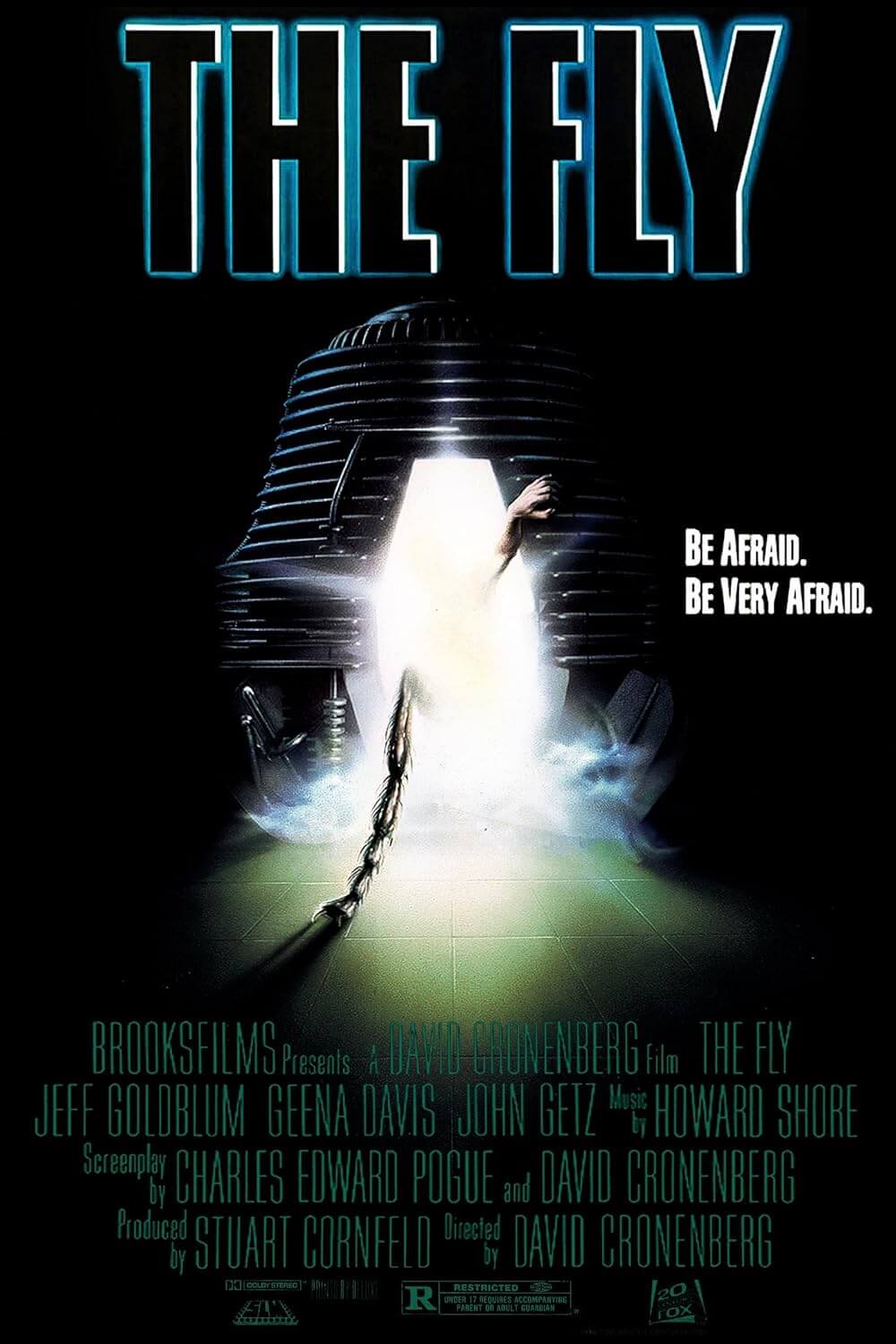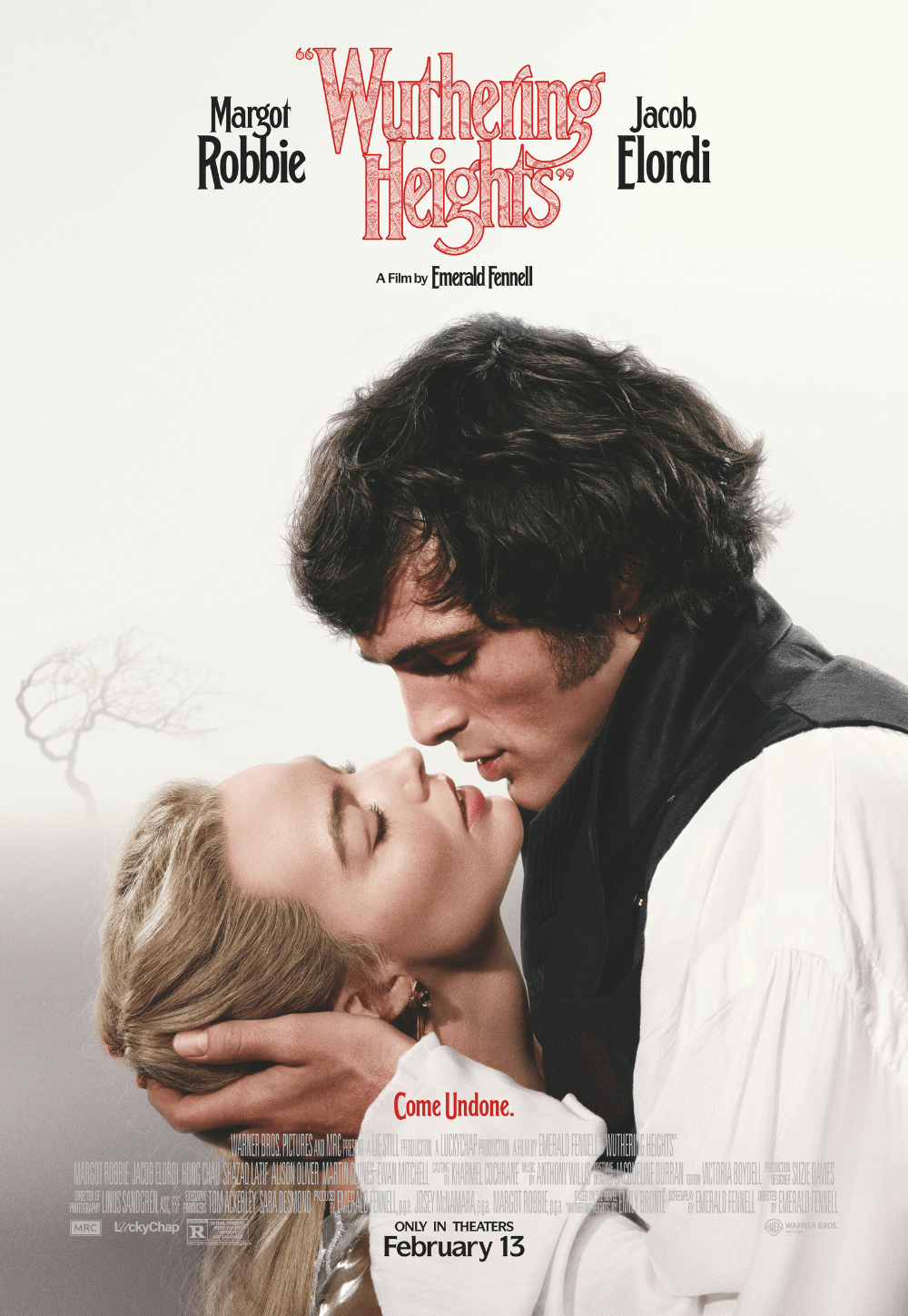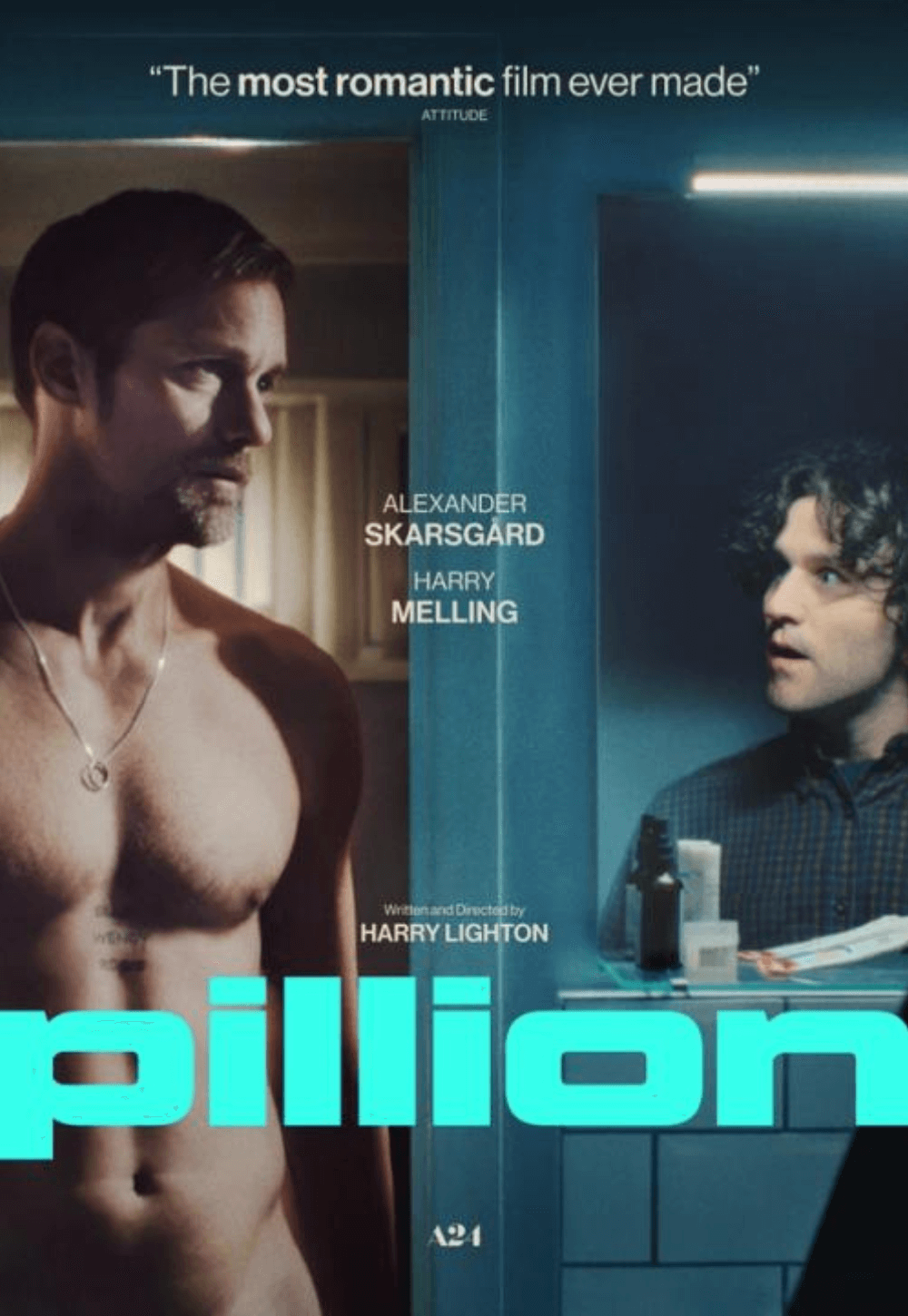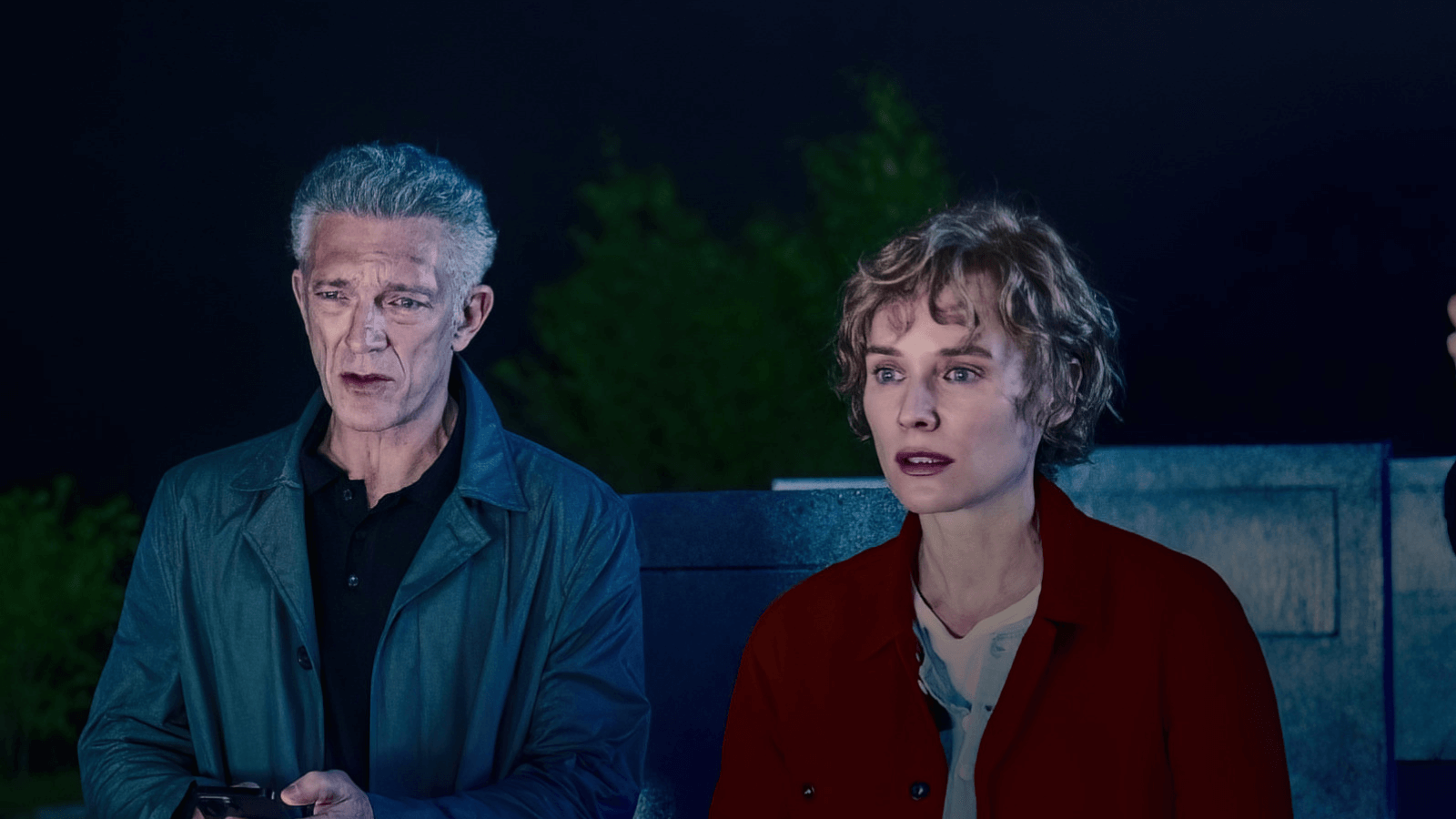
The Shrouds
By Brian Eggert |
“How dark do you want to go?” That’s a question only a David Cronenberg character asks on a first date. Karsh, a widower played by Vincent Cassel, asks this of Myrna (Jennifer Dale), a divorcée set up with him by their mutual dentist. In the age of information overload and online profiles, their blind date is an oddity, so perhaps this speaks to Myrna’s sense of adventure. Karsh, who made a fortune as an entrepreneur and producer of industrial videos, owns the chic restaurant where they dine, located in a unique cemetery of his own invention. Karsh’s late wife, Rebecca (Diane Kruger), died of cancer a few years earlier. Her grave isn’t far from their spot. Karsh wonders if Myrna would like to see it, and she agrees. But it’s not just a matter of visiting Rebecca’s gravesite. Rebecca’s body has been wrapped in a “metallic ninja” shroud that, using a device Karsh invented, called GraveTech, allows him to observe her decomposing corpse on a screen, located on her tombstone or accessible on an app on his phone—in a 360° view and 8K resolution, no less. He finds it oddly comforting to see her and, in a way, share that space with her.
This is the central device of Cronenberg’s latest, The Shrouds, a film some have characterized, even dismissed, as a mere variation on the Canadian auteur’s long-present themes: an unflinching acceptance of desire no matter how morbid or taboo; conspiracy and corporate espionage; fictional contraptions and physical mutations that bring us closer to understanding the mind-body dichotomy in our evolving world; and deadpan humor about his invasive ideas. While these interests have propelled his work since his earliest output, Cronenberg continues to evolve in his specificity, adapting and growing to reflect and comment on the world around him. If some filmmakers continue to embrace their preoccupations to the point of stagnation—see Wes Anderson, Tim Burton, Zack Snyder—Cronenberg’s cinema remains alive and well for his persistent interest in the biological and technological processes we often ignore or actively compartmentalize.
The Shrouds is Cronenberg’s most autobiographical work since weaving aspects of his disintegrating marriage to his first wife into his disturbing feature, The Brood—an early sign that the director had more on his mind than schlock or exploitation. He was an artist, working through his emotional state in his creative work. Divorced the same year as that film’s release in 1979, Cronenberg had fictionalized the prolonged emotional toil of a custody battle and frayed relationship with his then-spouse, whom he believed to be unstable, into a body-horror B-movie about a twisted form of therapy called “psychoplasmics.” Oliver Reed plays a radical doctor whose novel treatment causes the protagonist’s disturbed wife to produce childlike monsters out of her suppressed rage and trauma, born from disgusting, sack-like psychosomatic growths around her body. The creatures act on her subconscious desires, targeting people who represent perceived threats to her family or emotional stability. Around the time of The Brood’s release, Cronenberg married his second wife, Carolyn Zeifman, and they remained together until her death in 2017.
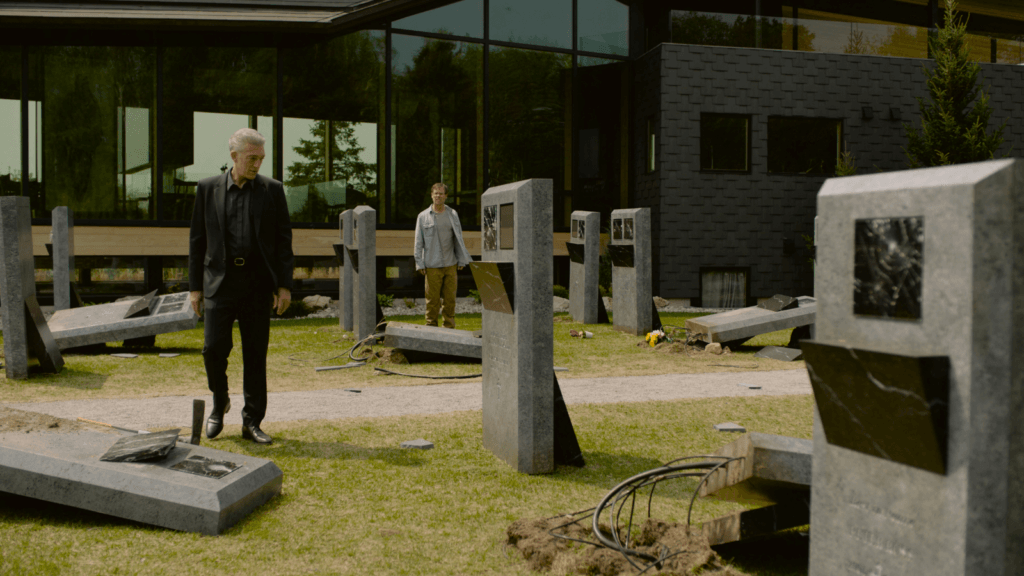
Cronenberg has acknowledged that The Shrouds is a personal project with autofictional aspects to the story. Looking at Cassel—who makes his third appearance in a Cronenberg film after playing a Russian mobster enamored with Viggo Mortensen in Eastern Promises (2007) and a bohemian analyst in the Jungian drama A Dangerous Method (2011)—the actor resembles his director. Whether by chance or design, they both have shimmering gray hair slicked back to showcase a long, skeletal face with tired yet active eyes. Karsh also has a persistent interest in his dead wife’s corpse, and Cronenberg has spent a considerable and understandable amount of time processing his wife’s passing. Not long after making Maps to the Stars (2014), his acidic takedown of Hollywood celebrities, Cronenberg took an eight-year hiatus to be at his wife’s side during her battle with cancer and confront his grief. He returned to directing in 2022 with Crimes of the Future, his first original script since 1999’s eXistenZ, based on an earlier and set-aside project called Painkillers.
The Shrouds is another original idea from the auteur, though he initially developed the concept as a Netflix limited series. Although the streamer reportedly liked his pitch, they turned down the script. Cronenberg told Adam Nayman in The New Yorker that they wanted a “grief story” about the filmmaker’s wife and his emotional journey. Doubtless, when they read the director’s draft involving Karsh’s prolonged investigation into the desecration of Becca’s grave, a head-spinning network of several possible culprits, and dream sequences involving Karsh and a mangled Becca having sex after she has a breast and arm removed—Becca’s bones have become so brittle from chemotherapy that a simple thrust shatters her hip bone, in one of the most jarring moments in any Cronenberg feature—they were left scratching their heads. Needless to say, Cronenberg compressed his planned series into a feature, which debuted at the 2024 Cannes Film Festival to mixed reviews. Janus Films and Sideshow picked up the title for US distribution.
After the vandalization of several graves in his cemetery, including a complete data lockout by someone who hacked GraveTech, Karsh embarks on a “perfect detective story” to uncover the truth of those responsible. With the help of his techie former brother-in-law, Maury, who built the software behind the shrouds—played by Guy Pearce, somewhat unconvincingly—Karsh unravels a mystery. Why do all of the disturbed graves contain bodies with curious bone spurs that continue to grow after death? And are they actually bone spurs, or do their designs conceal their function as surveillance devices? Does this relate to Becca’s oncologist, who used her as a guinea pig to test his theories? It could be the religious extremists who call Karsh and his company “techno atheist infidels.” Or maybe it’s what Karsh calls the “graveyard politics” related to one of the many countries—Iceland, China, Russia—who have a problem with Karsh’s cemetery or want to turn the technology into a weapon. As the list of suspects grows, Karsh even questions his virtual assistant, Hunny, a flirtatious and ultimately malicious blonde AI modeled after Becca and voiced by Kruger.
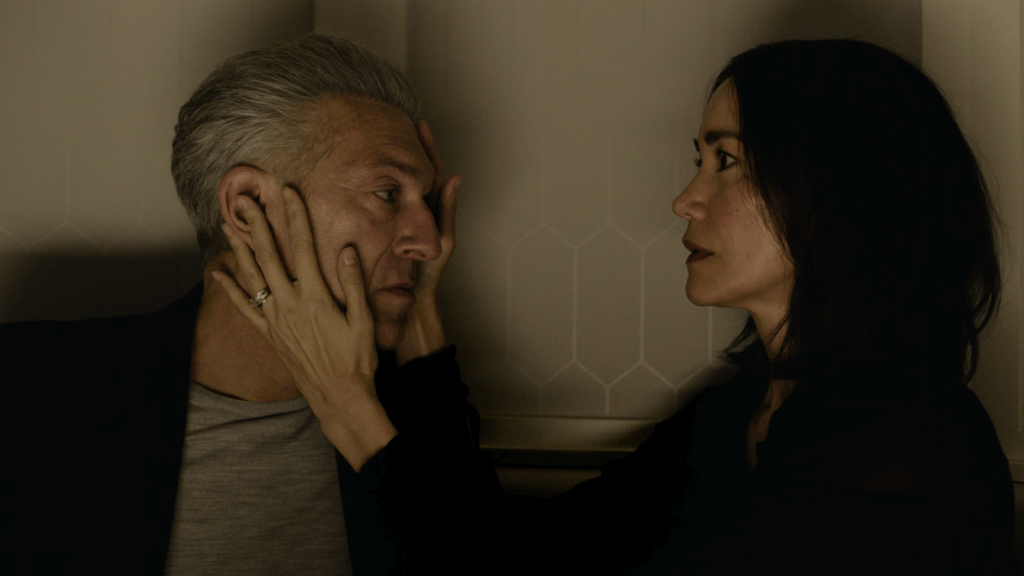
More grounded and accessible than the dizzying array of corporate and personal conspiracies are Karsh’s two romantic relationships in The Shrouds. The first arrives in the form of Soo-Min (Sandrine Holt), the sightless wife of a potential investor in GraveTech, who wants to open a cemetery in Budapest. She offers Karsh his first chance at intimacy since Becca’s death and a further chance to move forward with his business. More affecting is Karsh’s eventual coupling with his dead wife’s identical twin sister, Terry (also Kruger), formerly married to Maury. Vowing on Becca’s deathbed not to sleep with Terry, Karsh’s guilt over their eventual hookups might also be a step backward in terms of his healing, given their visual similarities. That they talk about Becca while having sex adds to the psychosexual quality of these sequences, which are often capped by Karsh’s subsequent dreams of Becca returning from the doctor nude, with various parts of her body having been removed.
Cronenberg works with many of his usual behind-the-scenes collaborators on The Shrouds. Production designer Carol Spier alternates between Karsh’s cold, device-fueled office space and his new apartment in Toronto with a Japanese-influenced aesthetic, including a shimmering koi canal surrounding his bed. Reteaming with cinematographer Douglas Koch after Crimes of the Future, Cronenberg’s visuals are sharp and detailed, almost conspicuously cold and polished with hints of warmth, like a dead body trying to will itself back to life. The production’s relatively low budget nonetheless allows for vile CGI imagery, particularly with the VFX used to render Becca’s cancer-ravaged body. Another effective scene involves Karsh putting on a shroud to look through his living body, under the skin, like a Body Worlds exhibit. As ever, Howard Shore’s music underscores the melancholy and thoughtful mood of the piece, established by another of Cronenberg’s hypnotic title sequences—this one an array of shapes comprised of minute particles, like computerized murmurations.
However grim and serious The Shrouds may sound, it’s not without Cronenberg’s droll humor. For all the visionary ideas and philosophical concepts driving his work, the 81-year-old director’s self-awareness—which never steps into ironic self-parody, thankfully—allows for moments of unlikely chuckles. For example, Karsh boasts about GraveTech’s data security, quipping that “everything’s encrypted, pun intended.” Or consider the opening scene of Karsh at the dentist, the same one who sets him up on a blind date. “Grief is rotting your teeth,” he says, before offering JPEGs of Becca’s dental X-rays for Karsh’s collection. There’s also something funny about Terry, a former veterinarian, who left the field to become a dog groomer—a vocation that, in cinema anyway, seems almost exclusively reserved for romantic comedies. Hunny, too, has an amusing bit where she appears as a koala bear. Then, of course, there’s the detail of Karsh taking his blind date to his dead wife’s grave to show her the skeletal, rotting body. Much like Crimes of the Future, Cronenberg has a way of acknowledging the absurdism of his scenario without robbing the material of its emotional or philosophical integrity.
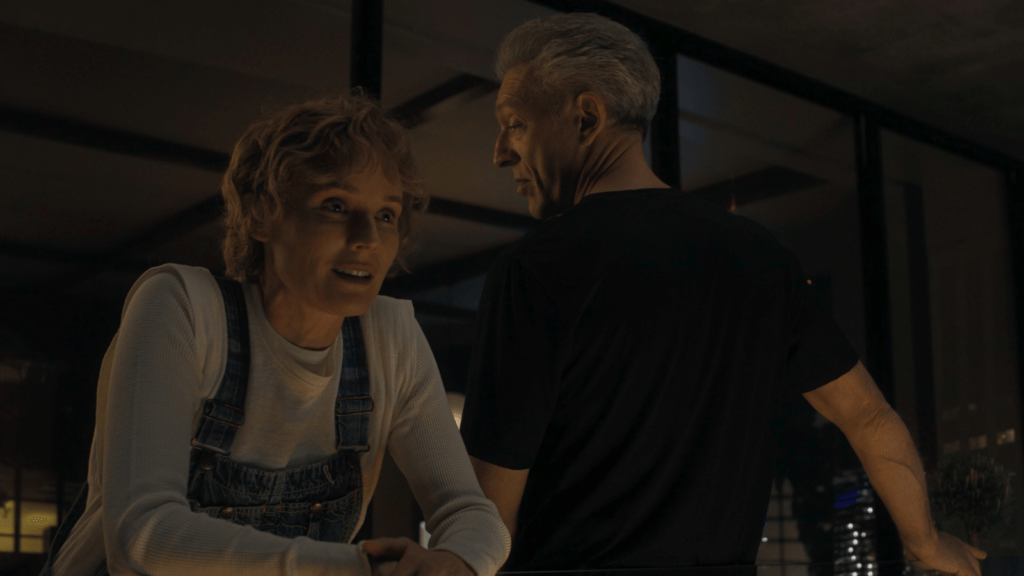
Admittedly, my initial response to The Shrouds was mild disappointment at the ending, which is ambiguous, searching, and guilt-ridden, yet somewhat perplexing in its resolution. But after days of sitting with the film, the emotional weight gradually settled in. It’s more than a story about a “corpse voyeur” or discovering the culprit behind the gravestone vandalism. This story has a tenderness in Karsh’s grief and inability to bury the past without a video window on Becca. Karsh might even need the mystery to work through and beyond his loss. Karsh notes that Becca was Jewish, and it’s a Jewish custom to bury their dead to allow the soul time to separate from the body, to which it has become understandably attached, as it returns to the earth. When a loved one passes, we try to remember them, but like a buried body disintegrating underground, memory fades. People move on, and those who have passed become less vital to our everyday experiences. Becca will always have a place in Karsh’s heart and mind, and GraveTech is a literalization of loss and his need to be reminded of her, even in a decaying state.
The Shrouds is one of Cronenberg’s most original, intimate, and moving films. Although the director has acknowledged in the past that there’s little room for the spiritual or supernatural in his decidedly secular cinema, Karsh, and by extension, Cronenberg, attempt to hold onto their memories of the departed in a physical way—Karsh through his technology, Cronenberg through his filmmaking. They, too, need time to separate from a person who meant so much to them. In this idea, Cronenberg has made his most emotional and tender film since The Fly (1986), his inspired remake about a love triangle, with a mad scientist who accidentally turns himself into a monster and, tragically, must be killed by his lover. While some have accused Cronenberg films such as Videodrome (1983), Naked Lunch (1991), Spider (2002), and Cosmopolis (2012) of being remote experiences rewarding intellectual readings but not emotional ones, there’s no mistaking the deep hurt from which The Shrouds emerged. In that sense, it stands as one of the director’s most affecting works to date.
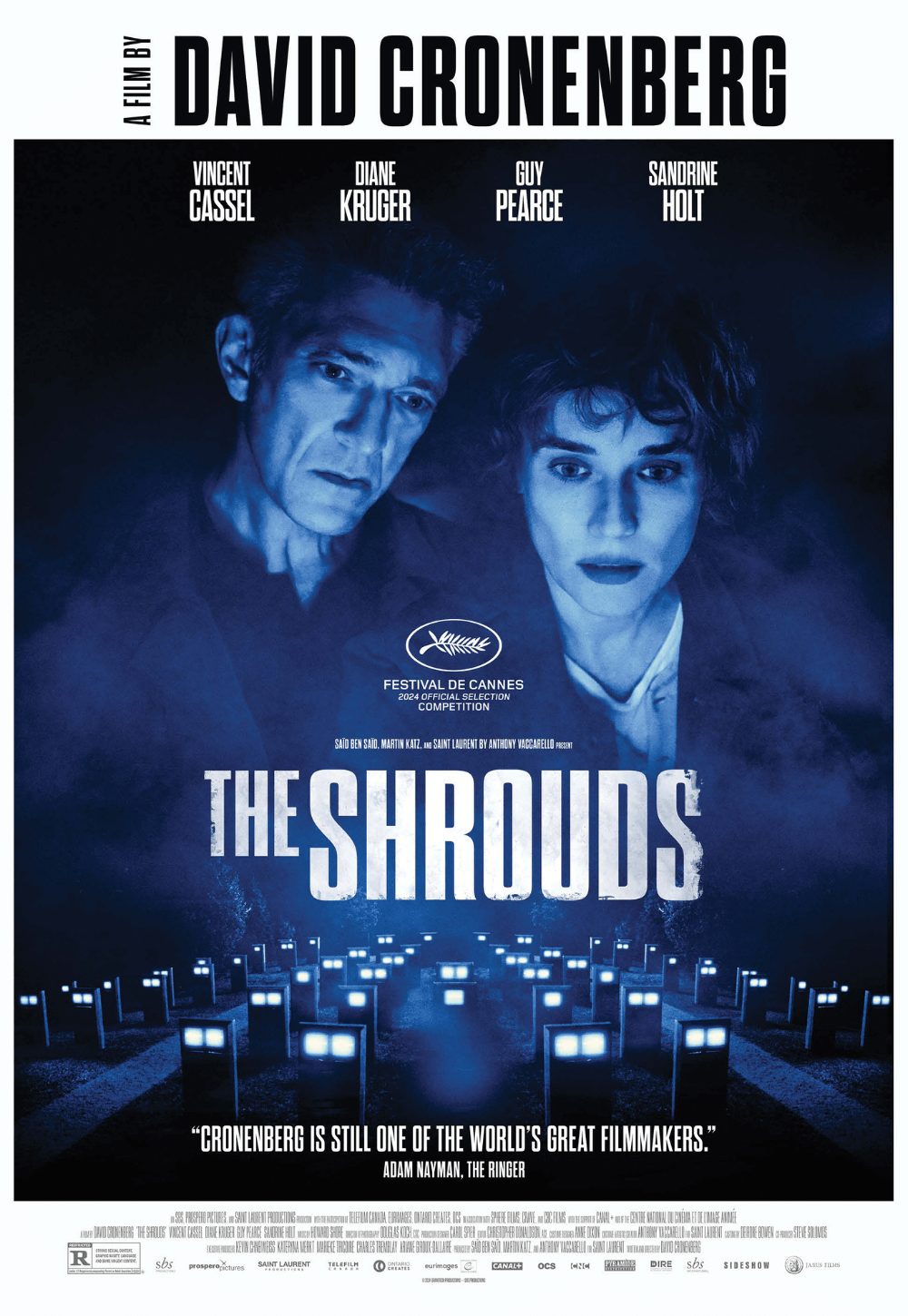
Thank You for Supporting Independent Film Criticism
If the work on DFR has added something meaningful to your love of movies, please consider supporting it.
Here are a few ways to show your support: make a one-time donation, join DFR’s Patreon for access to exclusive writing, or show your support in other ways.
Your contribution helps keep this site running independently. However you choose to support the site, please know that it’s appreciated.
Thank you for reading, and for making this work possible.
Brian Eggert | Critic, Founder
Deep Focus Review


